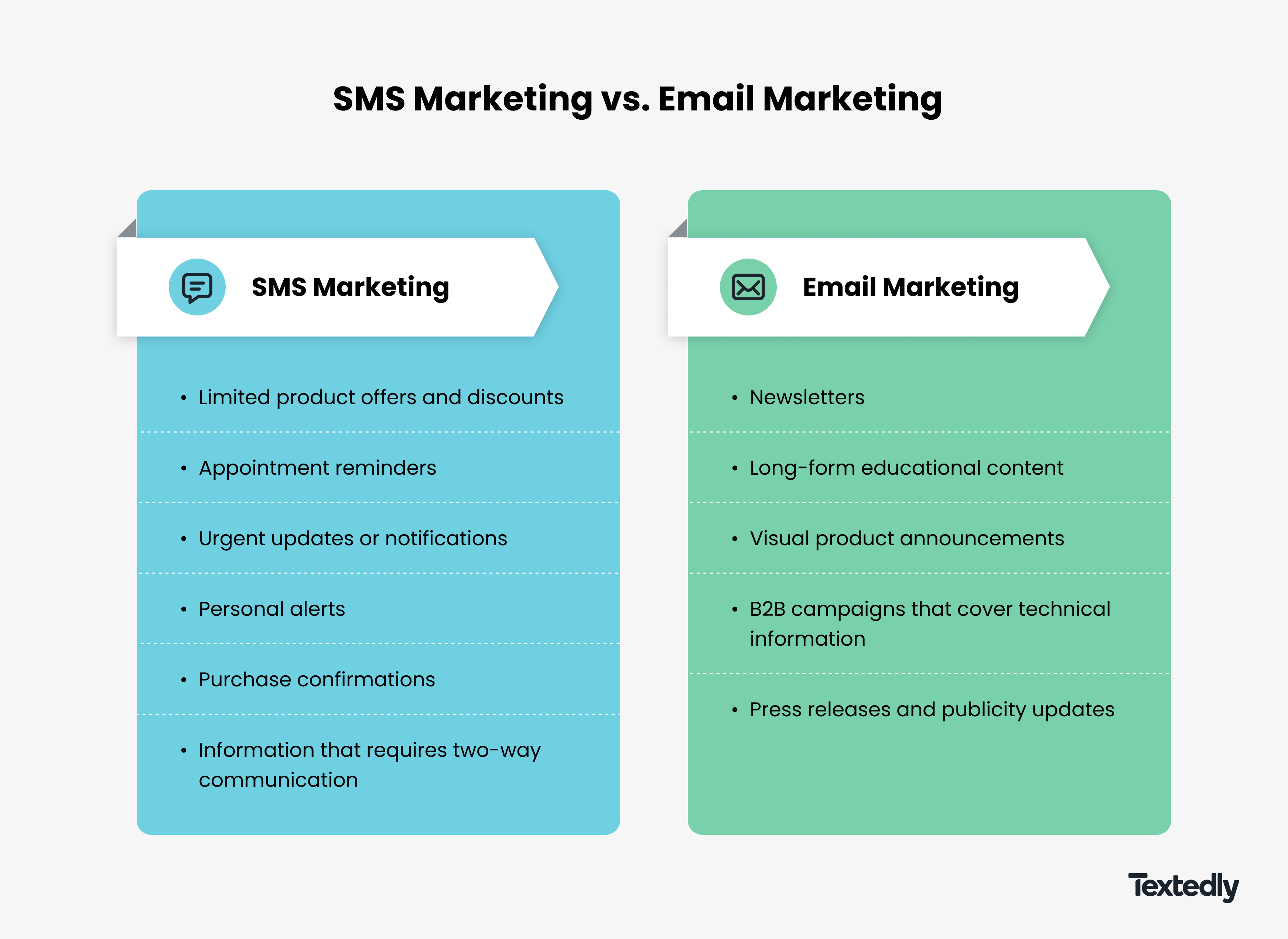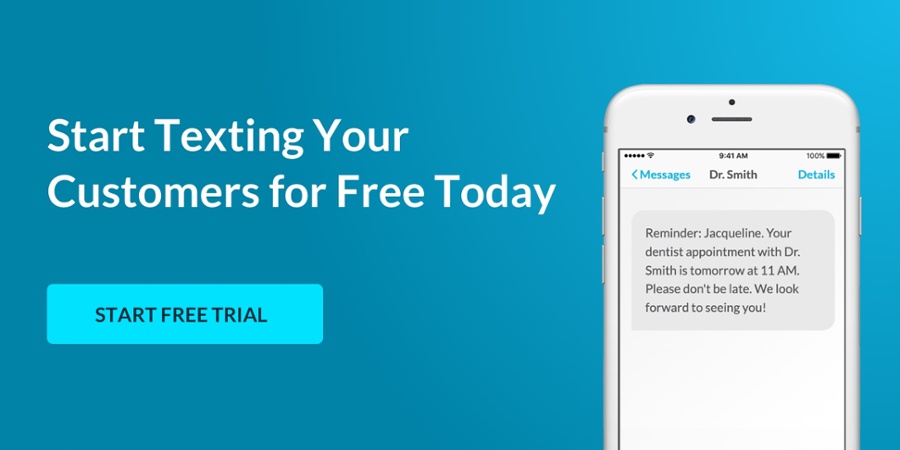Email has been the preferred method for sending and receiving mass messages and reaching audiences for decades. But, at the same time, text (or SMS) marketing is a fast, cost-effective and reliable way to share promotions and updates with customers. So when it comes to text message marketing vs. email marketing, which is better?
Text message marketing and email campaigns can work together to create seamless communication with customers. And, while some messages are delivered best via email, many marketing messages are more effective when sent via text.
Today we’ll cover the pros and cons of email and SMS marketing and how to choose which one is best for your business.
Table of Contents
- Understanding Email Marketing
- Pros & Cons of Email Marketing
- Understand SMS Marketing
- Pros and Cons of SMS Marketing
- SMS Marketing vs Email Marketing: How They Stack Up
- Choosing Between SMS and Email for Your Business
Understanding Email Marketing
Email marketing is a form of digital marketing that involves sending commercial messages to a group of people using email. Its purpose ranges from building brand awareness, promoting products or services, engaging with customers and potential clients, to driving sales and fostering loyalty.
This marketing strategy is characterized by its direct and personalized approach, allowing businesses to tailor messages according to the different segments of their audience based on interests, behaviors, and customer journey stages. Common uses of email marketing include newsletters, promotional campaigns, transactional emails such as order confirmations and shipping alerts, and customer loyalty programs. Through email, companies can provide valuable content, announce new products or services, share news, offer exclusive deals, and gather feedback.
Pros and Cons of Email Marketing
Let’s start with the advantages. Email campaigns can be highly targeted, allowing companies to tailor their messages to specific segments of their audience based on demographics, behaviors, or past interactions. This level of customization can lead to higher engagement rates and better conversion rates. Moreover, email marketing provides valuable analytics and insights, enabling businesses to track open rates, click-through rates, and other key metrics to refine their strategies over time.
However, despite its many advantages, email marketing also has its drawbacks. One of the most significant challenges is the potential for emails to be marked as spam, leading to lower deliverability rates and damaging the sender's reputation. Additionally, with the prevalence of spam filters and overflowing inboxes, it can be challenging for businesses to cut through the clutter and capture the attention of their recipients. Despite these challenges, with careful planning and execution, email marketing can be a powerful tool for businesses to engage with their audience and drive results.
Understanding SMS Marketing
SMS marketing, or short message service marketing, is a powerful digital marketing strategy that leverages text messages to reach and engage with customers. Unlike email marketing, which relies on email, SMS marketing involves sending short, concise messages directly to customers' mobile devices. SMS boasts incredibly high open rates. This high level of engagement makes SMS marketing an ideal tool for driving customer engagement, promoting sales, and delivering personalized offers.
However, it's crucial for businesses to use SMS marketing responsibly, as excessive or irrelevant messages can lead to customer frustration and opt-outs. By striking the right balance and delivering valuable content, businesses can harness the power of SMS marketing to connect with their audience in a direct and impactful way.
Pros & Cons of SMS Marketing
One of the biggest advantages of SMS marketing is the unparalleled immediacy. Text messages are typically read within minutes of being received, making it an excellent channel for time-sensitive promotions or urgent updates. Additionally, SMS marketing is highly versatile, allowing businesses to send personalized messages, conduct surveys, or even facilitate two-way communication with customers. However, SMS marketing also has its drawbacks.
As with any marketing approach, SMS has some drawbacks. For example, if used incorrectly, SMS carries the potential for message fatigue or annoyance if customers feel bombarded with too many texts. Moreover, many mass texting platforms limit text message length, which can make it challenging to convey complex messages or detailed information. Fortunately, Textedly allows users to send longer messages and leverage the full power of text messaging.
SMS marketing is also subject to strict regulations, including laws governing spam and data privacy, which businesses must navigate carefully to avoid fines or damage to their reputation. Despite these challenges, when used strategically and responsibly, SMS marketing can be a highly effective tool for engaging customers and driving business results.
Email Marketing vs. SMS Marketing: How They Stack Up
SMS marketing and email marketing are both powerful tools in a marketer's arsenal. Each with its own strengths and weaknesses. Both SMS marketing and email marketing offer unique advantages and challenges. SMS excels in immediacy, high open rates, and simplicity, while email provides greater flexibility, reach, and analytical capabilities. Ultimately, the best approach for businesses is often a combination of both, leveraging the strengths of each channel to create a comprehensive and effective marketing strategy tailored to their audience and objectives.

Choosing between Email & SMS
SMS and email both have their strengths and work best as complementary channels. SMS is best for time-sensitive information, urgent requests, or two-way communication. Email is best for long, rich media content that users can access later.
Here are a few ways to use email and SMS together:
- Send text messages to encourage customers to subscribe to your email list for weekly newsletters.
- Send order confirmation receipts via email and follow up with SMS tracking updates.
- Send emails to inform customers about new product launches. Then, send mass SMS texts to announce flash sales on the latest products.
Pro Tip: Be careful not to overwhelm customers with marketing messages. Email marketing frequency depends on your industry and how often customers hear from your business. In general, one to two bulk emails per week are ideal for most companies.
Use Textedly to Start Messaging Customers Immediately
When it comes to email vs. text marketing, the decision is clear: choose both! When used in conjunction with email, SMS marketing is a great way to build brand awareness and grow relationships with customers who want to hear from you.
Even if your ideal vehicle is email, adding SMS to draw customers’ attention to their email inboxes is a wise investment and uses marketing resources strategically.
Whether you’re brand-new to text message marketing or want to try out a new platform, Textedly can help. Textedly provides straightforward, flexible SMS solutions that are easy to set up, so you can start messaging customers immediately.
Get started with a free Textedly trial to jumpstart your SMS marketing strategy.







.png)